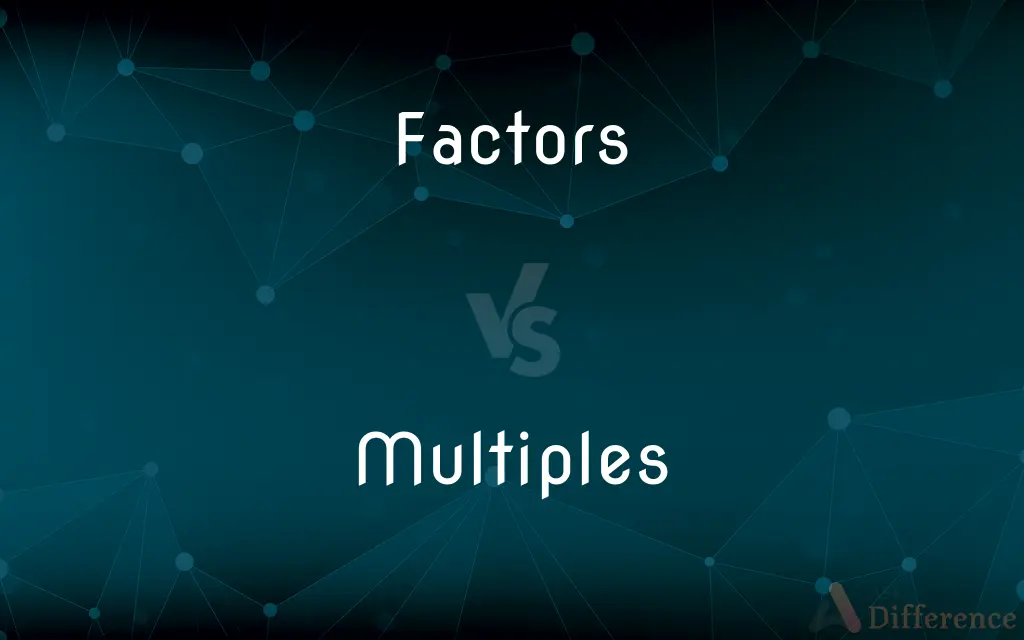Factors vs. Multiples — What's the Difference?
Edited by Tayyaba Rehman — By Fiza Rafique — Published on October 24, 2023
Factors are numbers that divide exactly into a given number, leaving no remainder. Multiples are numbers obtained by multiplying a given number by each of the integers. Both are related to division and multiplication, respectively.

Difference Between Factors and Multiples
Table of Contents
ADVERTISEMENT
Key Differences
Factors are integers that can be multiplied together to yield a given number. For instance, the factors of 12 are 1, 2, 3, 4, 6, and 12. Multiples, on the other hand, are the result of multiplying a given number by various integers. For instance, the multiples of 12 include 12, 24, 36, and so on.
In factors, we're looking at numbers that divide evenly into the given number. In multiples, we're essentially doing the opposite; we are taking the given number and multiplying it by different integers to get a new set of numbers. Factors are smaller than or equal to the given number, whereas multiples are greater than or equal to the number.
The list of factors for any given number is finite. For example, the factors of 15 are 1, 3, 5, and 15. On the other hand, the list of multiples for a given number is infinite. For instance, the multiples of 5 are 5, 10, 15, 20, and so on, extending indefinitely.
Factors and multiples are taught in elementary mathematics to help students understand the properties and relationships of numbers. While factors are crucial for understanding division, greatest common divisors, and simplifying fractions, multiples are important for understanding multiplication, least common multiples, and concepts like skip-counting.
Comparison Chart
Definition
Numbers that divide into a given number without a remainder
Numbers obtained by multiplying a given number by integers
ADVERTISEMENT
Number Type
Usually smaller or equal to the given number
Usually larger or equal to the given number
List Length
Finite list for each number
Infinite list for each number
Operation
Related to division
Related to multiplication
Use Case
Simplifying fractions, finding greatest common divisors
Skip-counting, finding least common multiples
Compare with Definitions
Factors
Factors are numbers that divide into another number exactly.
The factors of 10 are 1, 2, 5, and 10.
Multiples
Multiples extend infinitely for any given number.
The multiples of 2 never end: 2, 4, 6, 8, etc.
Factors
Factors are always smaller than or equal to the number for which they are factors.
All factors of 7 are smaller or equal to 7.
Multiples
Multiples are numbers obtained by multiplying a given integer by other integers.
The multiples of 3 are 3, 6, 9, 12, etc.
Factors
Factors are integral divisors of a given number.
3 and 4 are factors of 12.
Multiples
Multiples help in finding the least common multiple (LCM).
The least common multiple of 3 and 4 is 12, found among their multiples.
Factors
Factors are used to simplify fractions.
The factors of 8 and 12 help simplify the fraction 8/12 to 2/3.
Multiples
Multiples are used for skip-counting.
Skip-counting by 5 involves naming its multiples: 5, 10, 15, etc.
Factors
One that actively contributes to an accomplishment, result, or process
"Surprise is the greatest factor in war" (Tom Clancy).
Multiples
Multiples are larger or equal to the number of which they are multiples.
All multiples of 5 are greater than or equal to 5.
Factors
One who acts for someone else; an agent.
Multiples
Having, relating to, or consisting of more than one individual, element, part, or other component; manifold.
Factors
One who purchases accounts receivable at a discount.
Multiples
A number that may be divided by another number with no remainder
4, 6, and 12 are multiples of 2.
Factors
(Mathematics) One of two or more quantities that divides a given quantity without a remainder. For example, 2 and 3 are factors of 6; a and b are factors of ab.
Multiples
Plural of multiple
Factors
A quantity by which a stated quantity is multiplied or divided, so as to indicate an increase or decrease in a measurement
The rate increased by a factor of ten.
Factors
A gene. No longer in technical usage.
Factors
(Physiology) A substance that functions in a specific biochemical reaction or bodily process, such as blood coagulation.
Factors
To determine or indicate explicitly the factors of
If you factor 70, you get 2, 5, and 7.
Factors
To engage in purchasing accounts receivable at a discount.
Factors
Plural of factor
Common Curiosities
Are factors usually smaller than the number they divide?
Yes, factors are generally smaller or equal to the number they divide.
What are multiples?
Multiples are numbers obtained by multiplying a given integer by each of the integers.
How are multiples related to multiplication?
Multiples are obtained by multiplying a given number by integers.
What are factors?
Factors are numbers that divide into another number exactly, leaving no remainder.
Is the list of factors finite or infinite?
The list of factors for any given number is finite.
What is the relationship between multiples and skip-counting?
Multiples are used in skip-counting, which is naming numbers in a counting sequence based on a fixed increment.
Are multiples usually larger than the given number?
Yes, multiples are generally larger or equal to the given number.
How do you find the factors of a number?
To find the factors of a number, divide it by all numbers up to itself and list the divisors that result in a whole number.
How do you find the multiples of a number?
To find the multiples of a number, multiply it by each integer, starting from 1.
Is the number itself always a multiple of itself?
Yes, the number itself is always a multiple of itself.
Is the list of multiples finite or infinite?
The list of multiples is infinite for any given number.
How are factors related to division?
Factors are numbers that divide into a given number without a remainder.
Can a number be both a factor and a multiple of another number?
Yes, for example, 3 is both a factor and a multiple of 9.
What is the relationship between factors and fractions?
Factors are used to simplify fractions by canceling out common factors in the numerator and denominator.
Are 1 and the number itself always factors of the number?
Yes, 1 and the number itself are always factors of the number.
Share Your Discovery

Previous Comparison
Nova vs. Chevelle
Next Comparison
Japanese Eyes vs. Chinese EyesAuthor Spotlight
Written by
Fiza RafiqueFiza Rafique is a skilled content writer at AskDifference.com, where she meticulously refines and enhances written pieces. Drawing from her vast editorial expertise, Fiza ensures clarity, accuracy, and precision in every article. Passionate about language, she continually seeks to elevate the quality of content for readers worldwide.
Edited by
Tayyaba RehmanTayyaba Rehman is a distinguished writer, currently serving as a primary contributor to askdifference.com. As a researcher in semantics and etymology, Tayyaba's passion for the complexity of languages and their distinctions has found a perfect home on the platform. Tayyaba delves into the intricacies of language, distinguishing between commonly confused words and phrases, thereby providing clarity for readers worldwide.












































